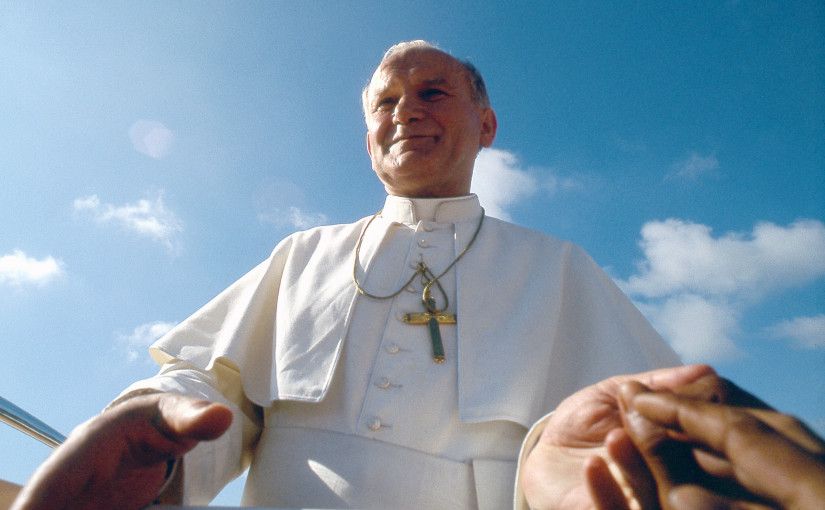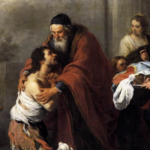The beginning of our new liturgical year marks the end of the Jubilee Year of Mercy declared by the Holy Father last December. Pope Francis believed the world to be in urgent need of the message of mercy, especially “at a moment full of great hopes and signs of contradiction”. Why have we as a society, even those devoutly practicing their faith, forgotten the message of mercy? Perhaps a reason for this is because we’ve submitted to a mentality of me, and only me. In response to a world that is increasingly hesitant to acknowledge our own lowliness, the universal Church declared the Year of Mercy – a year to reflect and celebrate the realness of Christ’s mercy. In many ways, this year was to be a lesson for me in the school of mercy.
In the midst of being entrenched in the me mentality, we often forget how much we truly need God. When we fail to acknowledge our own need, it is much easier to ignore the need of others. My reflection and experiences in the Year of Mercy have allowed me to view mercy as a twofold grace. The first is the recognition of our own need for mercy. In realization of our own need for mercy, we understand that it is not something earned, but rather something freely given by the Father. Instead of thinking of the things I do to receive mercy, we come to an understanding that we in our nature do not deserve it. To receive what we deserve is justice, and if we receive only what we deserve it would be a messy ordeal. Instead, the Lord also grants us mercy, but we need to be open to receive it just as a child unknowingly receives love from their mother and father. Leading up to this year, I understood mercy very differently compared to what I know now. In my mind, mercy was exclusively related to penance. I believed it to be only something gained from going to confession. Though it is true that through the absolution given that I am forgiven, it is not because of something I attained on my own. The grace is given from the unending fountain that is God’s mercy, by His will alone. I am in need.
“Jesus Christ is the face of the Father’s mercy. These words might well sum up the mystery of the Christian faith. Mercy has become living and visible in Jesus of Nazareth, reaching its culmination in him.” – Misericordiae Vultus

1,000+ young Catholic adults from all over the world celebrate Community Day, a pre-World Youth Day event including Mass and Adoration in Sandomierz, Poland.
The second aspect of mercy is the urgent call for us to be merciful to others. When we understand our own need for mercy, we come to realize the need of others. Suddenly the social, cultural, and economic walls we place between ourselves come crumbling down. Suddenly, we understand the homeless man we see regularly outside of work to be no different than us. We see those who persecute us for our faith (even in our own families) not as our enemies but as another person in need. We are all simply in need of mercy. Therefore, the second aspect of mercy requires us to look at our own hands. It calls us to be messengers of mercy, by our actions and by our spirit. We cannot withhold mercy from others when we ourselves have been blessed by it. It was through my pilgrimage to this year’s World Youth Day in Krakow, that I learned more about our need for mercy. In reflecting on the words “Lord I need You”, I came to understand my own desperate need for God, and my own calling to be a messenger of mercy when I returned home. We should look no further than the example of Christ as a model of indiscriminate mercy. The Son of God who came to eat with sinners also came to die for them, and it is this spirit that the Gospel calls us to live.
“The Church feels the urgent need to proclaim God’s mercy. Her life is authentic and credible only when she becomes a convincing herald of mercy. She knows that her primary task, especially at a moment full of great hopes and signs of contradiction, is to introduce everyone to the great mystery of God’s mercy by contemplating the face of Christ.” – Misericordiae Vultus
Since I returned home from my pilgrimage, I have been called constantly to be a messenger of mercy to those around me. The Lord wanted me to realize that the Father comes and welcomes us even when we are still far off – that mercy is a celebration which we are called to embody in our joy and service. Finally, He wanted to teach me that mercy is for everyone. It is for the faithful, the sinful, the enlightened, the ignorant, the rich, and the poor. God pours out His mercy on all of us. There is no one exempt. My prayer is that we can all live as messengers of mercy. May our hands be instruments of mercy and may our eyes see others as Christ sees them. Together let’s learn to first accept mercy freely from a God who gives abundantly and in turn be a source of mercy to those who need it most. If it ever becomes difficult for us to do either of these, let us remember wholeheartedly the words of the Divine Mercy: Jesus I Trust In You.
Sean Santos – Area Head | CFC-Youth Pacific Region




